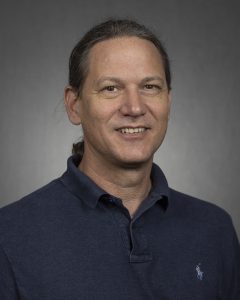As a child in Buenos Aires, Argentina, Carlos “Charlie” Messina knew he wanted to help people produce food worldwide, while also preserving the environment. But learning about agriculture in a big city wasn’t easy.
Fortunately, his father is an agronomist, and Messina found dad to be a fountain of knowledge. Riding around with him, Messina absorbed agricultural knowledge like a sponge.

“While studying, I was lucky enough to travel with my father and to learn from him when he worked in forestry and agriculture. Everything I know and value from transdisciplinary work is probably from those days,” he said. “Also, I spent hours on buses and trains studying during my commute to the university.”
All that non-classroom learning as a teenager paid dividends when he got to college. As an undergraduate at the University of Buenos Aires, Messina’s curiosity took him to the meteorology department to learn about El Niño, La Niña and climate change.
Messina found the meteorological knowledge helpful. La Niña events can lead to devastating droughts. By using artificial intelligence (AI) technology, Messina developed crop models to predict how plants respond to droughts. The models also led to algorithms to help farmers.
Also, as an undergraduate, Messina learned about other crop models. These were developed by Jim Jones, now a distinguished professor emeritus of agricultural and biological engineering at UF/IFAS. Jones served as Messina’s Ph.D. advisor at UF/IFAS.
After completing his doctorate, Messina worked for 17 years in the private sector, focusing on crop models and breeding.
While in the private sector, Messina pioneered research based on embedding crop-growth models within a quantitative genetics framework now known as crop growth model-whole genome prediction.
Then, in January, Messina came “home” to UF/IFAS as a professor of horticultural sciences. He works with breeders to improve the nutritional value of Florida produce and to reimagine agriculture as a solution to climate change. Messina also specializes in developing AI for plant breeding.
“The university has created a unique and exciting opportunity to envision and create the future by innovating at the intersection of agriculture and food science, engineering, AI and health sciences,” Messina said. “At UF/IFAS, I found a space to conduct research and translate the findings into societal benefits through programs such as UF/IFAS Extension.”
“I also value the opportunity UF/IFAS brings to train the next generation of plant breeders and to train a much-needed diverse cohort,” he said. “I came to UF to train the AI leaders of tomorrow. Finally, the commitment of UF leaders to make AI a successful transformational technology in agriculture and the great scientists working at UF makes it a great place to contribute to society.”
As with many land-grant institutions’ faculty jobs, Messina will conduct research and Extension. He’s also teaching.
During the spring semester, Messina worked with plant breeders to teach a graduate course, “Survey of Breeding Tools and Methods,” in which he introduced advanced concepts in AI. Now, Messina is developing a modeling course for this fall that will enable students to use AI to make data work for them.
Add the teaching to his research and Extension programs, and you find Messina, right at home, helping the next generation of AI technology developers and studying how he and plant breeders can help farmers.
“My approach to research and Extension is to innovate with plant Breeders and other scientists,” he said. “I think this is the most effective way to do Extension. I don’t wait until the end to transfer knowledge. I want to communicate with my stakeholders to work on problems they consider important.”
About AI at UF
The University of Florida is making artificial intelligence the centerpiece of a major, long-term initiative that combines world-class research infrastructure, cutting-edge research and a transformational approach to curriculum. UF is home to the most powerful, university-owned supercomputer in the nation, according to 2021 rankings released by TOP500, contributing to innovative research and education opportunities.
###
ABOUT UF/IFAS
The mission of the University of Florida Institute of Food and Agricultural Sciences (UF/IFAS) is to develop knowledge relevant to agricultural, human and natural resources and to make that knowledge available to sustain and enhance the quality of human life. With more than a dozen research facilities, 67 county Extension offices, and award-winning students and faculty in the UF College of Agricultural and Life Sciences, UF/IFAS brings science-based solutions to the state’s agricultural and natural resources industries, and all Florida residents.
 5
5
